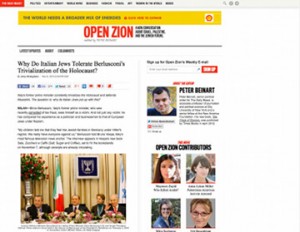Berlusconi, la Memoria e gli ebrei italiani
 In un ampio servizio (“Why Do Italian Jews Tolerate Berlusconi’s Trivialization of the Holocaust?”) che compare sulla prestigiosa testata giornalista online statunitense The Daily Beast, ci si chiede perché gli ebrei italiani tollerino una volgare distorsione e strumentalizzazione della Memoria da parte di Silvio Berlusconi. La redazione del Portale dell’ebraismo italiano www.moked.it e di Pagine Ebraiche ha inviato una propria nota che appare oggi sulle pagine del sito americano in cui si ricordano i puntuali interventi del presidente dell’Unione delle Comunità Ebraiche Italiane Renzo Gattegna per ribattere alle dichiarazioni rilasciate da Berlusconi. Nel gennaio di quest’anno il Presidente UCEI definì “destituite di senso morale e di basi storiche” le affermazioni secondo le quali il fascismo fu indotto a tradire gli ebrei italiani per compiacere l’alleato tedesco. Solo pochi giorni fa, Gattegna ha giudicato “non solo inappropriato e inaccettabile, ma anche offensivo” l’intento di Berlusconi, a fronte della condanna per frode fiscale a suo carico recentemente passata in giudicato, di tracciare un parallelo fra la situazione degli ebrei che subivano le persecuzioni naziste e quella dei suoi figli nell’Italia odierna.
In un ampio servizio (“Why Do Italian Jews Tolerate Berlusconi’s Trivialization of the Holocaust?”) che compare sulla prestigiosa testata giornalista online statunitense The Daily Beast, ci si chiede perché gli ebrei italiani tollerino una volgare distorsione e strumentalizzazione della Memoria da parte di Silvio Berlusconi. La redazione del Portale dell’ebraismo italiano www.moked.it e di Pagine Ebraiche ha inviato una propria nota che appare oggi sulle pagine del sito americano in cui si ricordano i puntuali interventi del presidente dell’Unione delle Comunità Ebraiche Italiane Renzo Gattegna per ribattere alle dichiarazioni rilasciate da Berlusconi. Nel gennaio di quest’anno il Presidente UCEI definì “destituite di senso morale e di basi storiche” le affermazioni secondo le quali il fascismo fu indotto a tradire gli ebrei italiani per compiacere l’alleato tedesco. Solo pochi giorni fa, Gattegna ha giudicato “non solo inappropriato e inaccettabile, ma anche offensivo” l’intento di Berlusconi, a fronte della condanna per frode fiscale a suo carico recentemente passata in giudicato, di tracciare un parallelo fra la situazione degli ebrei che subivano le persecuzioni naziste e quella dei suoi figli nell’Italia odierna.
Qui di seguito i testi degli interventi.
 “Why Do Italian Jews Tolerate Berlusconi’s Trivialization of the Holocaust?” reads the headline of a column written by the Italian journalist Anna Momigliano, published in The Daily Beast, an American news and opinion website.
“Why Do Italian Jews Tolerate Berlusconi’s Trivialization of the Holocaust?” reads the headline of a column written by the Italian journalist Anna Momigliano, published in The Daily Beast, an American news and opinion website.
As Momigliano herself acknowledges in the article, Italian Jews express a verywide range of political views and affiliations. Suggesting that they tolerate Berlusconi’s trivialization of the Holocaust as a Community, as the title of the article does, is not only inaccurate but also false.
While it is true that some Italian Jews in the public eye has expressed some degree of equivocation, the Union of Italian Jewish Communities (UCEI), the national umbrella organization which brings together Italy’s 21 Jewish Communities, is the only institution officially entitled to represent them and Italian Jewry vis-a-vis Italian and foreign institutions and governments. UCEI has promptly and unequivocally condemned Berlusconi’s words when he stated that, after he was convicted for tax fraud last summer, his children felt like the Jews must have felt under Hitler’s regime.
“The life of European Jews under the Nazis was marked by a vortex of violence, persecution and death, a catastrophe not only for Jewish people, but for the whole of human kind. Any comparison with the Berlusconi family situation is therefore not only inappropriate and unacceptable, but also offensive towards the memory of people who were deprived of every right and of their very own lives after atrocious sufferings”, UCEI’s president Renzo Gattegna said in a statement.
Berlusconi is not new to outrageous statements about the Holocaust.
Less then an year ago, during the inauguration of Milan Holocaust Memorial, on European Holocaust Memorial Day, he defended the fascist leader Benito Mussolini. “The government of that time, out of fear that German power might lead to complete victory, preferred to ally itself with Hitler’s Germany rather than opposing it”, he said, before downplaying Italy’s responsibilities for the persecution of Jews compared to Germany’s ones. “Our degree of responsibility is completely different. In Italy there was a not-entirely conscious connivance”.
Also back then, UCEI’s president reacted in shock and anger. “Berlusconi’s statements are not only superficial and inappropriate, but also, in suggesting that Italy persecuted and murdered its Jewish population only in order to please a powerful ally, are completely devoid of moral sense and historical basis. These words prove how much Italy still finds it difficult to seriously deal with its own history and responsibilities”, Gattegna said.
The editorial staff of Pagine Ebraiche and www.moked.it
Pagine Ebraiche and www.moked.it are Jewish Italian publications issued by the Union of Italian Jewish Communities – Unione delle Comunità Ebraiche Italiane
Why Do Italian Jews Tolerate Berlusconi’s Trivialization of the Holocaust?
MILAN—Silvio Berlusconi, Italy’s former prime minister, who was recently convicted of tax fraud, sees himself as a victim. And not just any victim: he has compared his experience as a politician and businessman to that of European Jews under Nazism.
“My children told me that they feel like Jewish families in Germany under Hitler’s regime. We really have everyone against us,” Berlusconi told Bruno Vespa, Italy’s most famous television news anchor. The interview appears in Vespa’s new book Sale, Zucchero e Caffè (Salt, Sugar and Coffee), set to hit the bookstands on November 7, although excerpts are already circulating.
You would expect Italian Jews to be outraged, right? The truth is, some were. But other were almost dismissive.
“It was inappropriate,” Riccardo Pacifici, president of the Orthodox community in Rome, Italy’s largest Jewish community, said of the comment. He also pointed out that such unfortunate language “belongs to the linguistic repertoire of all political sides.”
In fact no other major Italian politician has compared himself to the Jews under Nazism—certainly not in recent history. Pacifici then added that “Italian democracy can make mistakes, but it certainly is not a Nazi-fascist regime.”
“Italian democracy” was run by Berlusconi for nine non-consecutive years, until he was forced to resign in the winter of 2011, dogged by the economic recession and a number of criminal charges. Convicted of one of those chages, he is now banned from holding public offices but that legal ruling has yet to be enforced. The former prime minister always maintained he is innocent, claiming to be persecuted by the what he calls “communist judges.”
Presumably, that’s where the Nazi analogy comes from. Pacifici suggested that Berlusconi should “find a term of paragon closer to his own experience, and leave the Jews alone.”
This is not the first time Berlusconi has said something offensive on the subject of Jewish history. In 2003, for example,he claimed that Benito Mussolini, the fascist dictator of Italy, “did not kill anyone.”
In case you were wondering: Mussolini did kill a bunch of people, including 7,000 Jews sent to Nazi death camps with the help of the fascist regime. The extermination of Italian Jews is well documented by many sources, including Primo Levi’s autobiographical novel Survival In Auschwitz.
Even more outrageously, perhaps, he praised Mussolini in a public ceremony for Holocaust Remembrance Day, held last January in Milan. “The Racial Laws [that cancelled civil rights for Jews in 1938] were the worst sin of a leader who, in other respects, accomplished many positive things,” he said in front of a crowd composed of local politicians and Jewish leaders.
Unfortunately Berlusconi’s views, which are at best lenient toward Mussolini and his role in the killing of Jews, are not uncommon in Italy. Not only does Il Duce have a solid fan base among the far right, but there are also several “former Fascist” politicians who hold key positions in the mainstream-ish right— most notably, the former mayor of Rome Gianni Alemanno.
Even outside conservative and ultra-conservative circles, it is common to downplay the role played by Mussolini’s regime, and Italians in general, in the extermination of Jews.
The dominant narrative is the one of “Italiani brava gente,” or “Italians are nice people.” Many Italian history book focus on making a distinction between Nazism (bad) and fascism (not-so-bad): “Antisemitism and racist ideology was the main difference between Hitler’s regime and that of Mussolini,” wrote Renzo De Felice, a prominent historian who also noted that under Fascism “only 7,000 Jews lost their lives” (emphasis my own).
Moreover, a recent study on the representation of the Holocaust in Italian movies (“La Shoah nel cinema italiano”, edited by Andrea Minuz and Guido Vitiello, both professors at the University of Rome) shows that the majority of them tend to downplay the role of fascism in the persecution of Jews. Moreover, an impressive number of movies about World War II bear no reference of the Holocaust at all.
As of today, there is no Holocaust museum in Italy. The project for opening one in Rome was approved in 2008, but since then it has stalled as the issue proved to be too “controversial”—meaning embarrassing for the large section of Italy’s establishment that finds it convenient to downplay the role of the fascist regime.
In other words, Berlusconi’s trivialization of the Shoah and his lenient views regarding Mussolini are not uncommon.
The question, however, is why so many Italian Jews seem to put up with it.
There are no official statistics about the Jewish vote in Italy (some say that, given the country’s historical past, it would appear inappropriate to take survey on ethnic and religious basis) and there’s no reason to believe that Berlusconi receives a higher percentage of Jewish votes than do other candidates. But certainly his party has had the support of some prominent Jewish intellectuals, such as journalist Fiamma Nierenstein, and Ugo Volli, a professor of semiotics and a well known advocate of Israel.
When Berlusconi praised Mussolini at the Holocaust Remembrance Day ceremony earlier this year, Informazione Corretta, a pro-Israel conservative website to which Volli is a frequent contributor, dismissed his remarks as “a gaffe,” commenting, “Despite this, we all know that Berlusconi is a true friends of the Jews and a friend of Israel.”
Berlusconi is indeed a staunch supporter of Israel, and of Prime Minister Benjamin Netanyahu. But does this make him automatically a “friend of the Jews”? Is defending Israel an excuse for condoning fascism and trivializing the Holocaust? For some people, I fear, the answer is yes.
Anna Momigliano
(10 novembre 2013)
